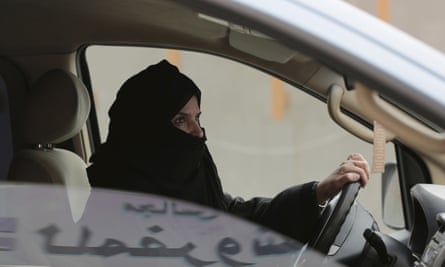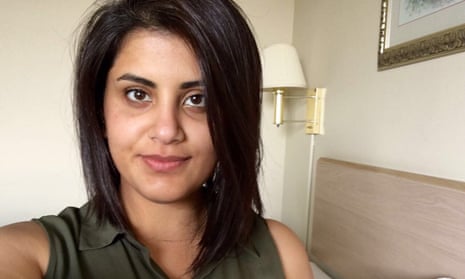Loujain al-Hathloul always likes to ask questions, her brother Walid says. “Growing up, she always pointed out the hypocrisy around driving in Saudi Arabia, trying to understand why women were banned from driving. She kept questioning.”
But when Hathloul, now 29, was pulled over while driving in neighbouring United Arab Emirates last April before being deported back to Saudi Arabia, the kingdom’s rulers began the latest in a series of increasingly brutal efforts to silence her.
Hathloul says she was detained for three days, freed and then seized again from her family home in Riyadh. She says she was blindfolded, thrown into the boot of a car and taken to a detention centre she has called a “palace of terror” and has been tortured, and threatened with rape and death. Hathloul has now been held for more than a year.
Hathloul was arrested with 10 other women in a sweep targeting outspoken women who had campaigned for the right to drive. The arrests included veteran campaigners like Aziza al-Yousef and blogger Eman al-Nafjan. It marked a crescendo in what human rights groups have branded Saudi’s “year of shame”. Clerics, activists, journalists and writers have been targeted.
Eleven women were put on trial for “coordinated activity to undermine the security, stability and social peace of the kingdom” amid accusations of contact with foreign diplomats and journalists. Seven were bailed earlier this year, but Hathloul’s brother says the family do not expect the same for her. Observers say Hathloul has received particularly poor treatment in prison because of her role as a leading feminist campaigner, her activism seen as a slap in the face to the kingdom’s narrative that change for women should come from the top. As the trial drags on, no one is clear just how long her imprisonment could be.

Dr Hala al-Dosari, a prominent Saudi human rights activist and scholar at the Centre for Human Rights and Global Justice at New York University, said the women are on trial “as a deterrent. They’re being treated as an example for other women who might think of doing the same thing.”
According to Amnesty International, the women were held incommunicado for a month and subjected to electric shocks, as well as psychological and physical torture.
Walid al-Hathloul, Loujain’s brother, spoke to the Guardian from Canada, where he stayed to avoid a travel ban imposed on the entire family within Saudi. “A month after she was arrested, she called my parents from a hotel in Jeddah,” he said. “Whenever my parents asked about the case, she said she couldn’t answer – it seemed like someone was telling her what to say.”
Dosari says Hathloul was singled out. “She received the most severe torture while in detention. It shows you the state is really aware of her influence, how she represents a wider vector of society who really relate to her and her aspirations.”
Saud al-Qahtani, the infamous former adviser to Crown Prince Mohammed bin Salman, visited Hathloul in detention to oversee her torture, according to Walid.
“He sat in on one of the sessions. He told her: ‘I’ll kill you, cut you into pieces, throw you in the sewer system. But before that, I’ll rape you,’” Walid said.
Hathloul remains more concerned about the fate of women outside the prison walls than herself, said her brother.
“Even when she was in jail, although she didn’t witness women being allowed to drive in Saudi Arabia, she kept asking me how women there were feeling, whether they were enjoying their right to drive,” Walid said. “She was thinking about them even though she was in jail, and it wasn’t a time to think about others.
“She never gives up. She believes in fundamental rights. She’s there to think about other people. That’s who she is as a person, she cares about others more than she cares about herself.”
Rauza Khan, a friend since they met at Vancover’s University of British Columbia, said Hathloul was “always an outspoken person with this intoxicating laugh that makes heads turn. She would always be very confident, very knowledgeable. She never feared to speak her mind. It was always mesmerising to be friends with someone like that.”
Urooba Jamal, who along with Khan has campaigned as part of the group “Friends of Loujain,” to push for her release, tweeted a photo of her from 2012 at a UBC event. “Characteristically, she is in the centre,” she wrote.

Khan said Hathloul would drive everywhere she could while in Canada, often offering rides to friends. “For everyone [else] I suppose this is a basic necessity, but I guess coming from Saudi, it was a kind of luxury to be able to drive,” she said.
Hathloul continued to grow her online presence, cementing her reputation as a critic of the restrictive rules around male guardianship, which prohibit women from travelling or undertaking other independent activities without male permission. “As much as she’s an outspoken, modern woman, she’s also very patriotic. You would never hear her bashing her culture or government in any way,” said Khan. “Saudi and its culture was a part of her. The only thing she wanted were basically minor improvements that would lead them into the modern world.”
Walid said his sister would never be content to campaign for women’s rights in Saudi Arabia from afar.
Hathloul first made headlines in 2013, when her father recorded a video of her driving from the airport to their house as part of the “Women to Drive” movement, a campaign that prompted a police crackdown. A year later, while living in the UAE, she was detained after driving her car to the Saudi border. She spent 73 days behind bars, an experience she later described as “enriching”.
Dosari said she was immediately impressed by Hathloul when they met at a conference in the US. “I felt this was someone to be supported as an icon and an agent of change,” she said. “For me, I felt she is an amazing example of someone privileged, with all the potential to live a very prosperous life, but one willing to take a risk for people.”
Dosari, who repeatedly referred to Hathloul as an “icon”, said she has sparked fear from the ruling powers because “she has a voice not empowered by the state”.
The Hathloul family now await Loujain’s regular phone call every Sunday to know that she is surviving what has become solitary confinement, after her cellmates were bailed. Her supporters fear that she may have been subject to torture once more, but that she won’t worry her family.
“Because she’s been traumatised and isn’t thinking properly, she said: ‘Because they damaged my reputation, it’s better for me to stay in jail as what they did to me was so horrific,’” said Walid.
But his sister’s reputation is anything but damaged. Along with Eman al-Nafjan and Nouf Abdulaziz, she was awarded the PEN America/Barbey freedom to write award in March this year. In April, she was named one of Time magazine’s 100 most influential figures of 2019.

Hathloul’s growing international reputation as an inspirational feminist has fulfilled an ambition of her mother’s. Khan recounted how her friend told her about her mother seeing a magazine with a woman on the cover. She was presented as a smart and confident business woman, and it made an impact.
“She said that she gathered [Loujain] and her sisters, and told them she wanted them to be like that woman in the magazine. To know what they were doing, to have a clear path. She told them not to be afraid to take charge, and do whatever it takes to achieve results,” she said.
